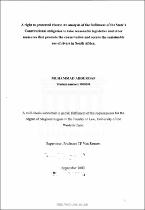| dc.description.abstract | This mini-thesis deals with the right to protected rivers whereby it analyses the fulfilment of the State's Constitutional obligation to take reasonable legislative and other measures that promote the conservation and secure the sustainable use of rivers in South Africa. In South Africa, water is one of the most limited resources. It is used in almost every part of its nation's existence and a lack of it would cause their destruction. Due to the indispensable roles water play in our lives, we have to conserve and protect the sources from where it is derived before they are all exhausted. Water scarcity is a matter of international concern. This is highlighted by water security having been a key issue at the world summit for sustainable development in 2002. Furthermore, our constitution of 1996 affords everyone the right to sufficient
water. Therefore, rivers that provide us with the majority of our potable water need to be protected, conserved and used in a sustainable manner. Everyone has a right to an environment not harmful to their health or well-being; and to have the environment protected, for the benefit of present and future generations, through reasonable legislative and other measures that, inter alia, promote its conservation and secure its sustainable use. ' Rivers form part of the environment and the state should take reasonable measures for its protection, conservation and sustainable use. These measures include co-operation, partnerships, policies, strategies, financial support and action plans. Furthermore, it includes taking part in international agreements. There is however no national legislation or policy which main areas of concern are river protection, its conservation and sustainable use. However, there are other measures in place that deal with the protection, conservation and sustainable use of the environment that find application to rivers. However, these measures have to be reasonable in order to meet the standard laid down in our constitution. The standard laid is not for the measures to be put on paper, but for the measures to achieve the constitutional objective. This is the protection, conservation and sustainable use of our rivers. In this work, I analysed measures taken and also demonstrated what these measures should entail in order for them to be reasonable. There are a number of measures that assist in the conservation, protection and sustainable use of rivers in South Africa that has been analysed in this research. To mention a few, I dealt with the national water act of 1998, the environment conservation act of 1989 and the national water act of 1998. All the measures taken by the state require the principle of co-operative governance to be applied in order to effectively assist in the protection, conservation and sustainable use of rivers in South Africa. This mini-thesis is concluded with an overview of the measures taken and recommendation for future activities. | en_US |

